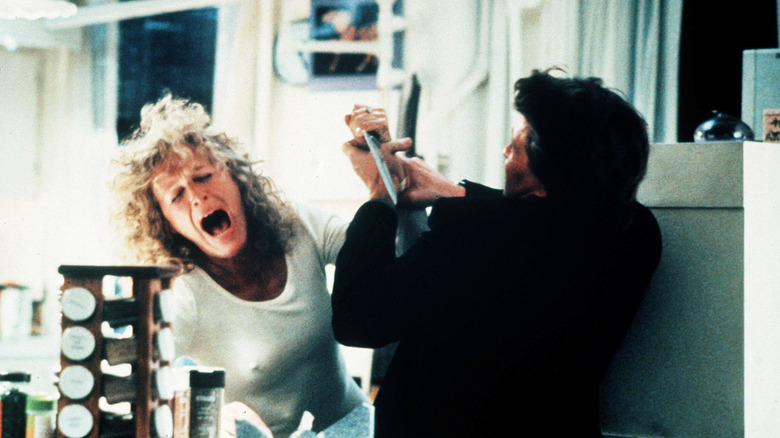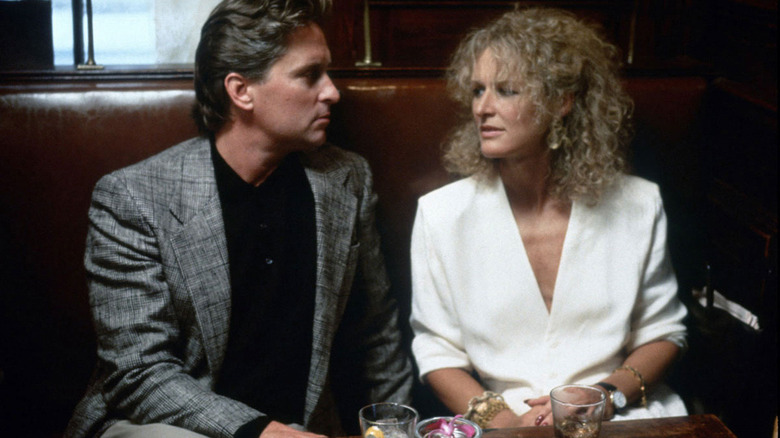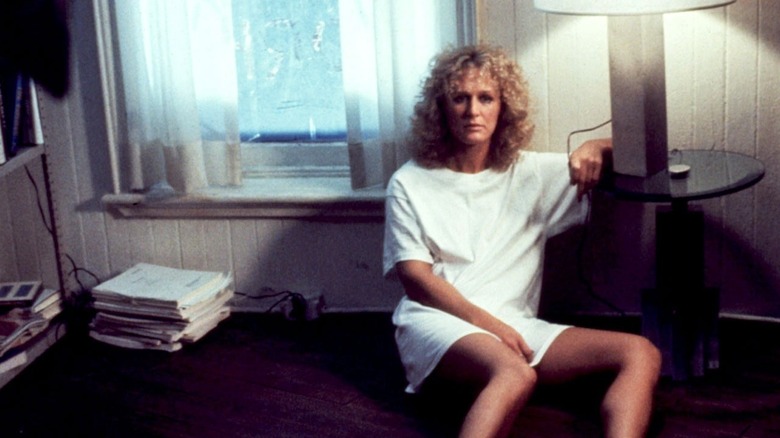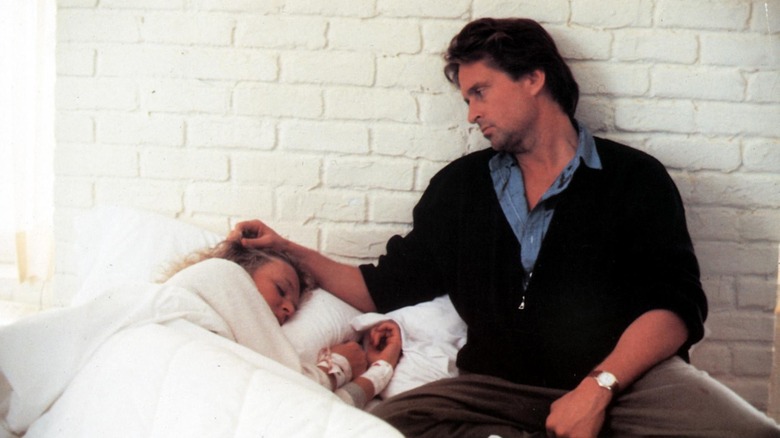The Alternate Fatal Attraction Ending We Didn't Get To See
There's always something a little off about them, isn't there? They might be charming, or alluring, or a bit kooky, but there's also an unusual quality that you just can't put your finger on. Yet still you let them into your life, your home, or even your bed. It's only after they change their appearance to look like you ("Single White Female"), or break into your bedroom while you're having sex ("Unlawful Entry"), or secretly breastfeed your baby boy so he'll reject your milk ("The Hand That Rocks the Cradle"), do you realize: this person is absolutely crazy. Maybe murderously so...
The late '80s and early '90s was the peak period for the psycho thriller, a craze kicked off in 1987 by Adrian Lyne's hit, "Fatal Attraction." We can always see the signs well before the protagonist, which is part of their appeal. When Dan (Michael Douglas) first sees Alex (Glenn Close) at a party, the woman he is about to have an ill-advised fling with, she gives his best buddy a murderous scowl. They laugh it off as her just being angry about the guy's crass pickup line, but there's more to it than that — she looks like she genuinely wants to kill him.
After Dan and Alex have a weekend-long sex session while his wife Beth (Anne Archer) and daughter are out of town, Dan wants to break it off, no strings attached. Alex has other ideas, and becomes dangerously unstable, escalating towards a killer climax. "Fatal Attraction" was the top grossing film of 1987 worldwide and received six Oscar nominations, including Best Picture and Best Actress for Close. Yet the ending audiences saw in theaters wasn't the one originally intended...
What Was the Original Ending?
The original scripted ending had a tragic fate for Alex. After she has boiled the family bunny and kidnapped Dan's daughter, causing Beth to end up hospitalized after a car accident, Dan goes to her apartment to confront her. He almost chokes her to death in rage, but manages to control himself and let her go. In return, she tries to stab him with a large kitchen knife, but Dan manages to disarm her. He puts the knife down on the counter and leaves.
Back home with Beth and his daughter, detectives arrive to tell Dan that Alex has been murdered and he's the number one suspect. He denies it, but they haul him away. Beth frantically tries to find their lawyer's number, and discovers a tape from Alex where she threatens to kill herself. Realizing it will get her husband off the hook, Beth takes the tape to the police.
We then go to flashback and see Alex sitting on her bathroom floor with the knife, listening to "Madame Butterfly." She draws the blade across her throat and collapses out of frame, bleeding to death. The end.
This lonely death for Alex makes us sympathize with her, even though she is trying to frame Dan for her murder. We assume Dan will be exonerated for the murder, but he still looks like a complete POS for how he treated her. Such a bummer of an ending didn't work with test audiences, though. According to studio executive Ned Tannen:
"They want us to terminate the b**** with extreme prejudice."
Realizing that the audience wanted to see Alex receive punishment (that is, more punishment than ending her own life), the cast and crew went back for a three-week reshoot.
Glenn Close was not happy at all...
The New "Fatal Attraction" Ending
The ending that went out in theaters completely changed the tone of the film's conclusion and made it a little easier to side with the adulterous Dan. This time around, after bunny boiling, kidnap, and accident, Beth forgives Dan and they return home.
While Beth is running herself a nice hot bath, Alex suddenly appears with the knife. She blames Beth for standing between her and Dan, and tries to stab her. Dan comes to the rescue and drowns Alex in the bathtub. Now the film is more in the realm of horror than the original tragic ending, and Alex even pops back up for one last scare. This time, Beth finishes her off with a revolver. After the police leave the scene, Dan and Beth embrace, ready to start playing happy families the best they can.
Glenn Close was completely against the proposed new ending. Sherry Lansing, the former head of Paramount, revealed in her biography: "
She [Close] felt sympathy for Alex, a woman battling mental illness, and fiercely resisted cliches about another female psycho. And so she categorically refused to do the reshoot."
Close felt that the generic thriller ending turned her character, who she had carefully researched by visiting several psychiatrists, into a psychopath. She said:
"I wasn't playing a generality, I wasn't playing a cliché. I was playing a very specific, deeply disturbed, fragile human being, whom I had grown to love."
She reluctantly went ahead and filmed the scene. To add insult to injury, she ended up with an infection after getting her head dunked in the bathtub over 50 times. She later acknowledged that "Fatal Attraction" probably wouldn't have been such a box office success with the original conclusion, reasoning that the new ending offered audiences a feeling of catharsis.
The Backlash
"Fatal Attraction" has provoked a feminist backlash. There was Susan Faludi's 1991 book "Backlash: The Undeclared War Against American Women" where she argued that Dan got away pretty lightly while Alex was made to look like a completely negative character, but there are modern reappraisals and think pieces. As Kristen Lopez wrote in an article for Crooked Marquee:
In 2017 Fatal Attraction is a cautionary tale for women more than for men, reminding them of their inability to have it all. As much as Alex Forrest has accomplished in her personal life and career, the narrative reminds her that by society's standards she's unfulfilled without the white picket fence and house in the country that Dan and his family have. It's a fact Alex herself isn't even aware of until Dan callously cuts off contact with her after their passionate weekend. Dan wants to move on and pretend it never happened, and as a man he's allowed to, even encouraged by the audience to kill her. The film's intent in 1987 may have been to make Dan the hero, but with 30 years to mull it over, it's hard to believe he didn't have it coming.
Which ending is best? "Fatal Attraction" is a well-made glossy thriller, taking itself fairly seriously compared to more far-fetched entries in the psycho thriller catalogue. The arty original is more in keeping with the tone of the rest of the movie, but it's easy to see why a test audience wouldn't like it. The new ending is pure popcorn and thoroughly gripping in its own right — great if you're just in the mood to see the bad guy get blown away. I'm glad both exist, because each puts a different slant on the characters and their behavior.



